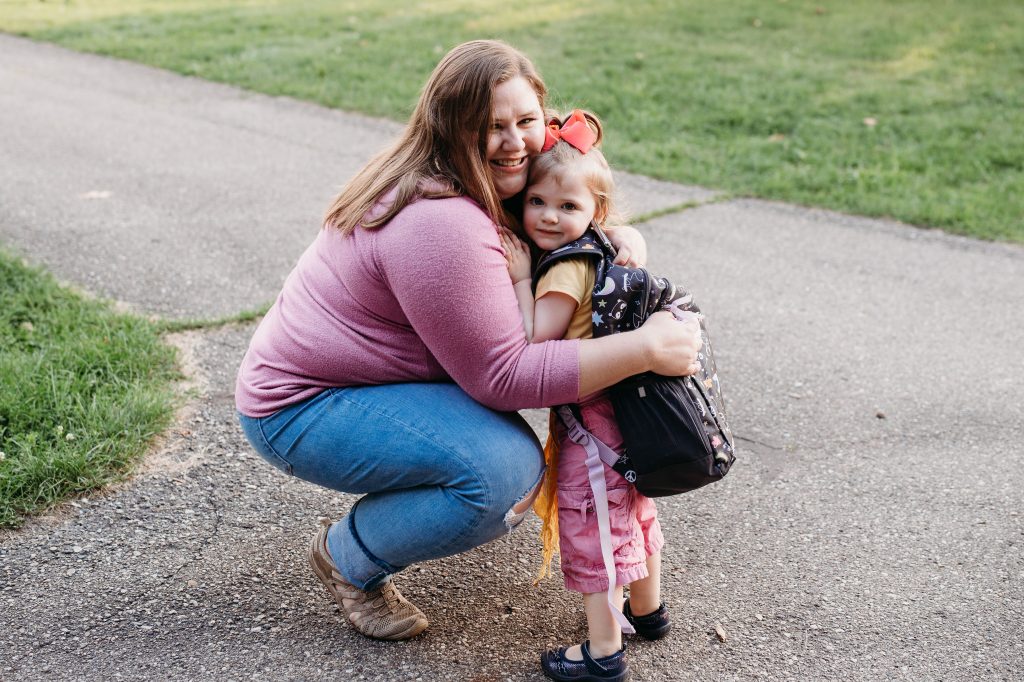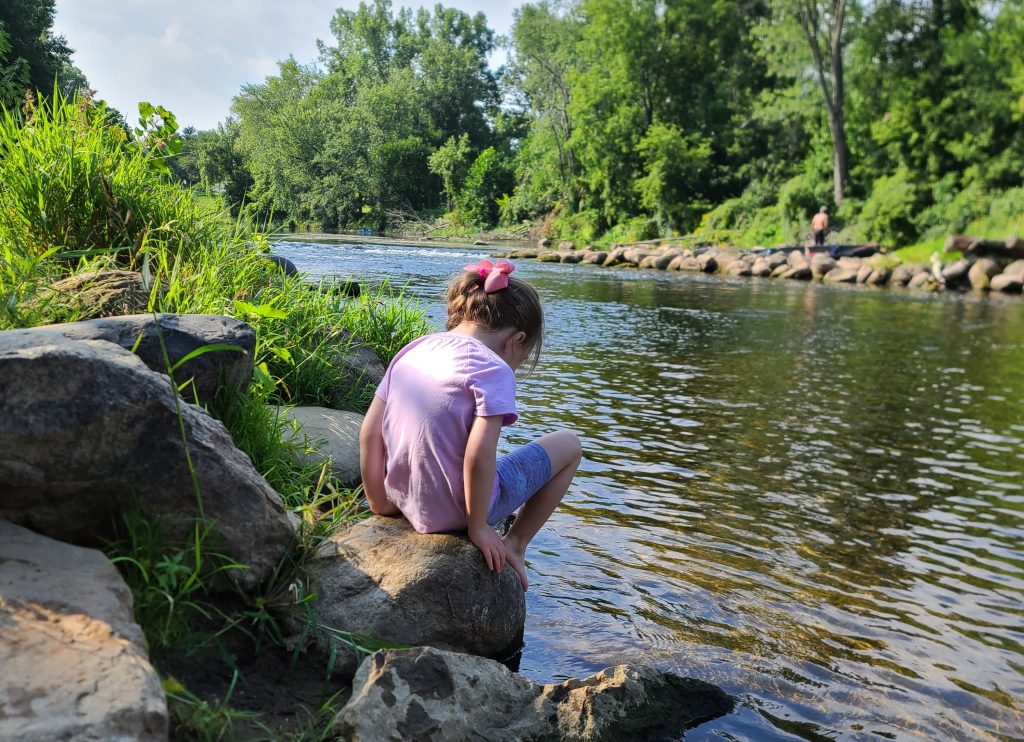This is the year I’m sending my child off to preschool and I got to thinking about preschool transition. Prior to Covid I was a full-time working mom. My firstborn was in childcare and we did drop offs and pick ups regularly. As an infant, our transition from preschool to home was extremely predictable. I would unstrap them from their car seat and carry them into the bedroom. Then, we would nurse, snuggle, and play peek-a-boo under the covers until my husband arrived home. When they grew, our routine changed to playing outside together after work and childcare or reading stories together on the couch.
Like many families, the global pandemic changed our family needs and I became the primary stay at home parent – no longer needing to manage the transitions to and from childcare. Now I find myself out of practice as we prepare to become a family tied to a school calendar for the first time. I’ve been reflecting on the strategies I’ve carried in my professional tool belt as I supported early parenting skills in others through the years. I know I’m not alone, and perhaps you might be seeking ways to connect and ease the preschool transition back home after first school experiences this fall.

Connecting Basics for Parents at Pickup
- Your phone is put away
- This tells your child that you are mentally present and ready to hear about their day.
- Your posture is warm and inviting
- Show your child you are their soft place to land after being away and “on” during class.
- Smile and face to face
- Providing your child with a twinkle in your eye and an expectant look reminds them just how much they are loved without conditions.
- Physical affection
- Whether its a hug, a high five, a kiss, or an arm around their shoulders, your child might find comfort in gentle touch from their trusted adult.
- Positive affirmations
- Say aloud what you’re feeling in that moment and reassure your child that you held them in mind while they were away. Say things like, “I’m so glad to see you,” “I missed you,” or offer something you wanted to tell them while they were at school.
- Limit conversations with teachers and other adults
- Keep those pick up conversations brief. Focus on your child and be assured that the teacher will fill you in if something was wrong. Waiting on teachers at pickup time can put the focus on them instead of on your child. If you need to, send an email or a text later to check in on how your child did. This likely will get a more detailed response from them. Chat with adults as you wait, but once you see your child headed your way shift your focus. You will avoid many behavior issues by just limiting this alone.
Micro Rituals
Do not underestimate the power of the small moments and micro rituals in preschool transition. One of my favorite books on connecting activities is Dr. Becky Bailey’s book I Love You Rituals. She states, “Rituals are moments taken solely for the purpose of connecting.” Think of something simple that you can say or do every single time you pick up to add a moment of assurance to your child. Here are a few examples of quick micro rituals:
- Tell them their brain grew while they were away.
- “Woah, look at that. Your brain is so much bigger, I can tell. Let me guess what you did today to make your brain grow so much!”
- Saying you really missed a part of them.
- “Let me see your nose, gosh I really missed that nose, I just want to eat it up! Hello nose, good to see you again.”
- Pretend to smell their hair and guess what they did at school.
- “Oh my goodness, you smell like glue and glitter. I bet you definitely definitely did an art project today.” Or even sillier, “You smell like dinosaurs, please tell me you didn’t find a REAL dinosaur in your classroom today.”
- Create a structured saying that expresses your love.
- “I missed you more than french fries miss ketchup!” Or, “I’m so glad to see you, I’m happier than a pig in the mud!”
Have a Plan for What Comes Next
Finally, for a smooth preschool transition, have a plan for what after school activity options you want to be prepared to offer.

For the child who needs to move, put in greenspace time together.
Your child has just spent several hours (or possibly a full day) in spaces surrounded by peers and engaging in multiple transitions. The freedom exploring open spaces and nature can offer might just be the thing your child needs. Not to mention, the Vitamin D your child will acquire during extra outdoor playtime is worth the benefit. Instead of finding yourself frustrated with a child whose body is dysregulated from the attention and focus required in school, you can provide a much needed outlet together before heading home.
For the child who physically clings, snuggle up with a story.
Reading gives your child permission to seek close proximity, hear your voice, and find comfort in familiar stories or tales. What you are doing during story time is predictable, familiar, and slower paced all leading to the feeling of safety your child needs. Allow your child to select their favorite books. For those of us parents who will miss the physical contact being in close proximity to our young children brings, cozy book reading together will fill our cup too.
For the child who’s hangry, make a snack together.
Maybe your child was too excited or nervous to eat their snack during their day. Preparing one together makes this a way to connect and helps prevent or stall any hanger or low blood sugar. You can chat about what happened at school or make a plan for what happens the rest of the day. Worried your child won’t eat their lunch or dinner if your return is close to that time? Make the snack something that would be part of those meals anyways.
For the child who’s irritable, get playful with person-to-person games.
Play is the language of childhood. Person-to-person games entail things such as tag, hide and seek, and rolling your child up like a taco in a blanket. Person-to-person games can relieve tension with elements of physical touch and laughter. Not sure you can come up with silly enough options for play? Look no further than the show Bluey. The father, Bandit, creates funny games you can try that will be sure to delight. Some of our favorites games we put our own spin on include “Backpackers” (Season 1, Episode 36), “Daddy Robot” (Season 1 Episode 4), and “Octopus” (Season 2 Episode 41).
Routines, rituals, and transitions to things like waking up and bedtime tend to be consistent in homes. By offering predictable moments during your child’s preschool transition, you can grow your parenting skills and strengthen your bond. Be assured, the ability to utilize rituals and warmth in your child’s return to you will be skills you’ll need for a lifetime.










